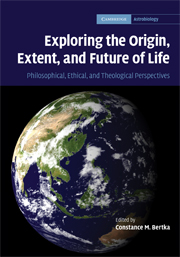 Exploring the Origin, Extent, and Future of Life
Exploring the Origin, Extent, and Future of Life from Part I - Origin of life
Published online by Cambridge University Press: 29 December 2010
The origin of life involved many, many emergences.
Harold MorowitzThe experimental investigation of life's origin commenced in earnest more than a half-century ago with the pioneering work of Miller, who synthesized many of life's molecular building blocks under plausible prebiotic conditions. Despite an initial euphoric sense that the origin mystery would soon be solved, scientists quickly realized that the transition from a geochemical to a biochemical world would not easily be deduced by the scientific method.
The great challenge of origins research lies in replicating in a laboratory setting the extraordinary increase in complexity that is required to evolve from isolated molecules to a living cell. The principal objective of this review is to describe some of the efforts by origin-of-life researchers to induce such increases in complexity. A unifying theme of these studies, and hence a useful organizing framework for this review, is the principle of emergence – the natural process by which complexity arises.
Emergence as a unifying concept in origins research
The origin of life may be modeled as a sequence of so-called “emergent” events, each of which added new structure and chemical complexity to the prebiotic Earth. Observations of numerous everyday phenomena reveal that new patterns commonly emerge when energy flows through a collection of many interacting particles.
To save this book to your Kindle, first ensure [email protected] is added to your Approved Personal Document E-mail List under your Personal Document Settings on the Manage Your Content and Devices page of your Amazon account. Then enter the ‘name’ part of your Kindle email address below. Find out more about saving to your Kindle.
Note you can select to save to either the @free.kindle.com or @kindle.com variations. ‘@free.kindle.com’ emails are free but can only be saved to your device when it is connected to wi-fi. ‘@kindle.com’ emails can be delivered even when you are not connected to wi-fi, but note that service fees apply.
Find out more about the Kindle Personal Document Service.
To save content items to your account, please confirm that you agree to abide by our usage policies. If this is the first time you use this feature, you will be asked to authorise Cambridge Core to connect with your account. Find out more about saving content to Dropbox.
To save content items to your account, please confirm that you agree to abide by our usage policies. If this is the first time you use this feature, you will be asked to authorise Cambridge Core to connect with your account. Find out more about saving content to Google Drive.